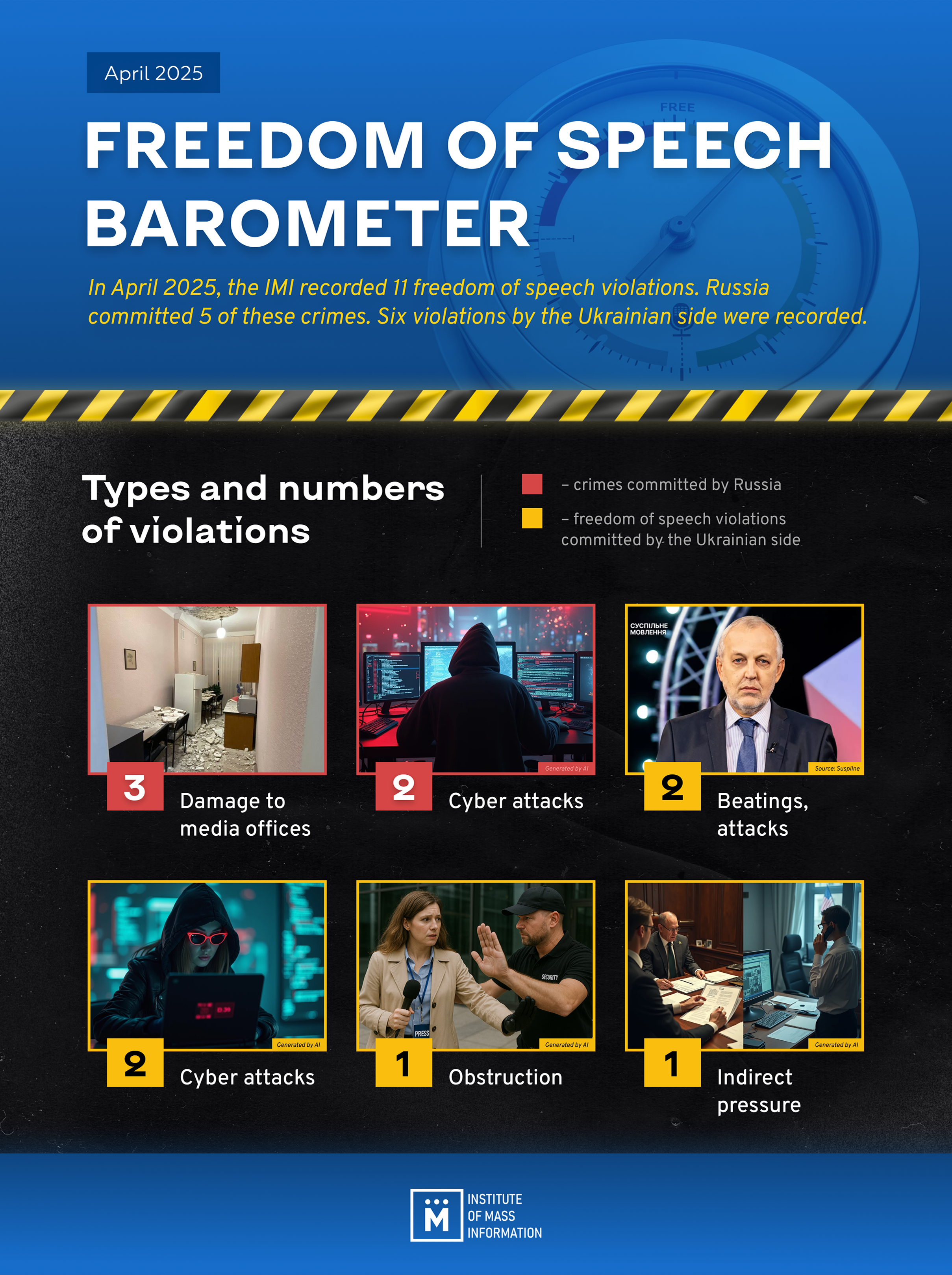The Institute of Mass Information experts recorded 11 freedom of speech violations in Ukraine in April, according to the IMI’s monthly monitoring study “Freedom of Speech Barometer”.
In April, the IMI recorded 5 crimes against the media and journalists that were committed by Russia. These included damage to media offices and cyber attacks.
The death of one media professional who had enlisted in the Ukrainian Armed Forces was reported in April:
Volodymyr Kotsur, sports journalist turned soldier. Volodymyr’s death was reported on April 29, 2025. He had enlisted in the Ukrainian Armed Forces following Russia’s full-scale invasion. He was a contributor to the news outlets Sports Express Ukraine, Ukrainskyi Futbol and Komanda.
Russian shelling strikes resulted in damage and destruction of several media offices in several cities:
- in Kyiv, the buildings that had housed the offices of the TV channels Dim and FREEDOM were severely damaged in a Russian ballistic missile strike, destroying the new FREEDOM newsroom and the top three floors of the business center housing the international broadcasting channels.
- in Sumy, the CUKR office and the Sumy Press Club were damaged. The strike also destroyed a photo exhibition by Kordon.Media at the Congress Center.
- in Poltava, the Poltavska Khvylia office was damaged (the shock wave damaged the office’s ceiling, deformed the lighting fixtures, and partially destroyed the interior structures).

Freedom of speech in Ukraine in April 2025
The Institute of Mass Information was targeted in a cyber attack, receiving multiple phishing emails from hackers affiliated with Russian intelligence. The emails were sent by the hacker group UAC-0050, which is affiliated with the Russian intelligence services. The phishing emails had the name of the NGO listed in the subject line, which made them stand out from similar emails the IMI has received in the past. The emails included an attachment with link to a zip document containing malicious files. Both emails were signed by a “chief accountant” addressing the IMI’s finance department with a demand to sign some documents and submit copies of them.
IMI representative Valentyna Troyan also received a phishing email with a malicious file attachment that collects data about the system.
The IMI recorded six freedom of speech violations unrelated to Russia’s war against Ukraine. These included attacks on journalists, obstruction, indirect pressure, and cyber attacks.
Two media professionals were attacked in April:
- in Kyiv: Yuriy Makarov, executive producer at Suspilne Broadcasting and a prominent journalist, was attacked and stabbed by an unknown man. Yuriy Makarov was hospitalized in serious condition, but there is no threat to his life. The police have opened a case under the article “severe bodily harm” (Part 1 of Article 121) and investigating the incident. Law enforcers are looking into the theory that the attack could have had a pro-Russian trail. Yuriy Makarov believes that the attack on him is most likely to have a “Russian trail” such as Russian intelligence aiming to demoralize society by attacking a public figure.
- in Chernivtsi oblast: independent journalist Diana Lavryk was injured while covering the conflict around the St. Nicholas Church in Verkhni Stanivtsi village (Chernivtsi oblast) switching from the Moscow Patriarchate to the Orthodox Church of Ukraine on April 8. The journalist was assaulted despite having clearly stated that she was a reporter performing her professional duty.
A Dumska journalist faced obstruction in Odesa. He was attacked by staff while filming at the municipal St. Pantaleon House of Mercy for the Elderly when the correspondent tried to enter the institution’s dining room to take photos of the meals served to the residents. The staff tried to knock the equipment out of his hands and even scratched his face.
Kremenchutska Hazeta chief editor Oleh Bulashov and Kirovohradska Pravda were targeted in cyber attacks. Bulashov’s likeness was featured in an AI generated video posted anonymously to Facebook. In the fake video, the chief editor appears to be commenting on Kremenchuk deputy Bohdan Lazorenko’s calls on Ukrainians to enlist in the Ukrainian Armed Forces. Kirovohradska Pravda sustained a large-scale phishing attack: the news outlet’s editorial phone number was receiving notifications about attempts to access the weekly’s official email account and Telegram channel for 20 minutes.
The website Rivnenski Novyny posted another discrediting article about Chetverta Vlada based around an anecdote shared by “Servant of the People” MP Dmytro Solomchuk, who claimed to have treated a Chetverta Vlada journalist to some buckwheat. Chetverta Vlada chief editor Volodymyr Torbich says both the MP’s story and the Rivnenski Novyny article are a lie.
Read the full monitoring study here.
The Institute of Mass Information (IMI) is a Ukrainian non-governmental media organization that has been operating since 1996. The IMI defends the rights of journalists, analyzes the media field and covers media-related events, fights propaganda and disinformation and has been providing media outlets with safety gear for trips to the combat zone since the start of the Russo–Ukrainian war in 2014.
The IMI carries out Ukraine’s only freedom of speech monitoring and keeps a list of high quality and sustainable online media outlets, documents Russia’s crimes against the media committed in the course of the war on Ukraine. The IMI has representatives in 20 oblasts of Ukraine and a network of “Mediabaza” hubs to provide journalists with continuous support. The IMI’s partners include Reporters Without Borders and Freedom House; the organization is a member of the International Organization for the Protection of Freedom of Expression (IFEX).
